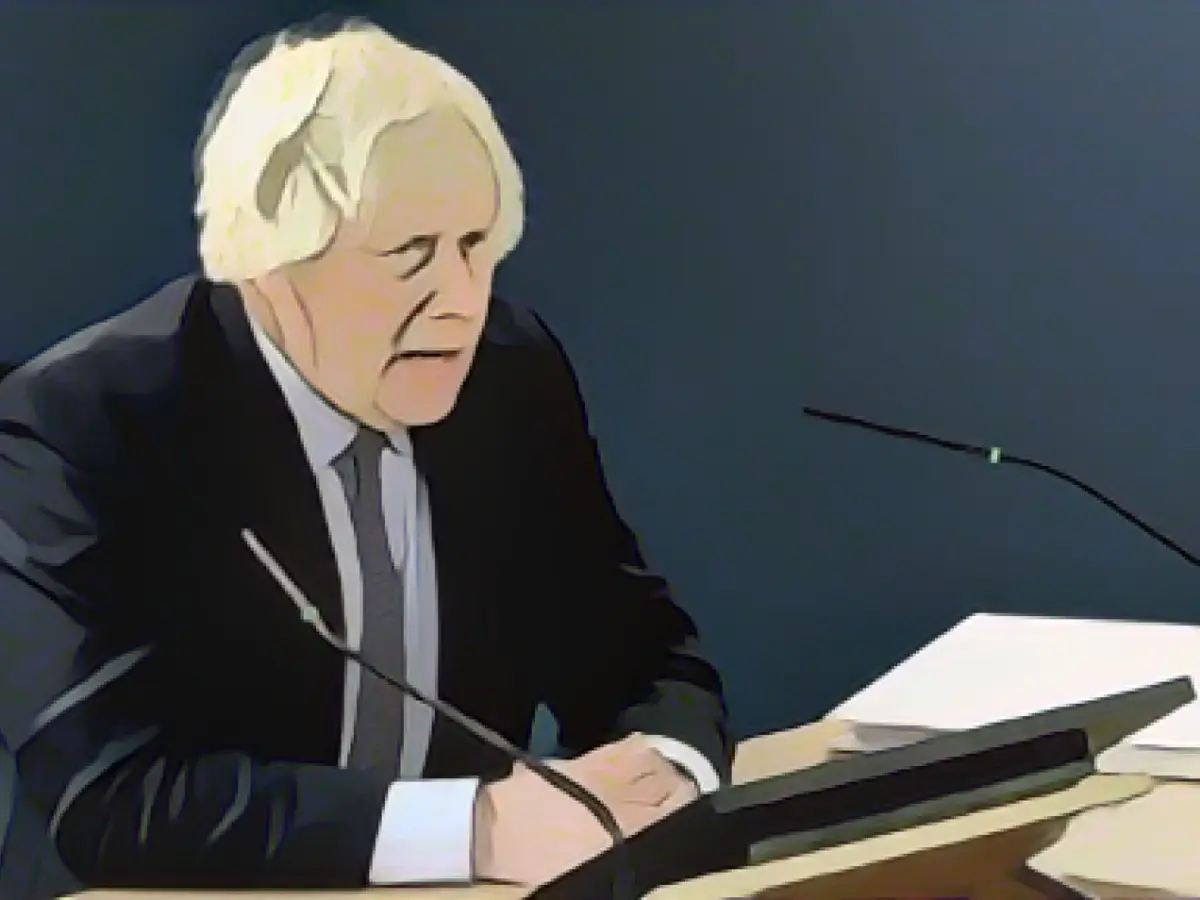British ex-Prime Minister Johnson apologizes to victims of the corona pandemic
On the first day of the two-day hearing, he said of his government's political actions during the pandemic: "We inevitably did some things wrong", but added: "We did our best." He accepted responsibility for the decisions made.
The newspaper "The Times" reported that Johnson wanted to emphasize in the hearing that his decisions had ultimately saved hundreds of thousands of lives. His government had achieved its main goal: by making the "right decisions at the right time", it had prevented the state healthcare system in the UK from becoming overburdened.
With regard to his behavior during the pandemic, Johnson will argue, according to the Times, that he had "a basic confidence that things would turn out well" - trusting the "misguided logic" that previous health emergencies had ended less catastrophically than feared.
More than 232,000 people died in the UK as a result of Covid-19, a disease caused by the coronavirus. This makes the country one of the hardest hit countries in the world in relation to the total population. By mid-July 2021 alone, 130,000 people had died from Covid-19 in the UK.
The current Prime Minister Rishi Sunak, who was Finance Minister at the time, is to be questioned later this year as part of the investigation into the government's handling of the pandemic.
Johnson had caused massive outrage with parties at his official residence during the coronavirus lockdown. He resigned from office in the summer of 2022. Sunak had previously resigned from Johnson's cabinet - and played an important role in his subsequent resignation.
Public inquiries in the UK, such as the one into the coronavirus pandemic, are funded by the government but are chaired independently. They investigate matters of public interest and are tasked with establishing the facts, determining the reasons for what happened and drawing lessons from them.
However, the committees of inquiry are not allowed to negotiate the civil or criminal liability of those involved and their recommendations are not legally binding.
Johnson arrived about three hours early for his questioning on Wednesday. Some observers saw this as an attempt to avoid a possible encounter with the bereaved families of Covid-19 victims, who gathered outside the place of questioning.
At the inquiry, which is due to continue on Thursday, Johnson is also likely to have to answer for the fact that the UK did not order a nationwide lockdown until March 23, 2020, at the beginning of the pandemic. The UK took this step much later than other European countries - and, according to several former ministers and scientific advisors, too late.
Johnson is likely to argue that a far-reaching restriction of public life was both personally and politically repugnant to him. Prior to Johnson's testimony, numerous former companions had been extremely critical of Johnson's handling of the pandemic before the coronavirus panel.
His top advisor at the time, Dominic Cummings, explained that in March 2020, Johnson had asked England's chief medical officer Chris Whitty and the government's chief scientific advisor Patrick Vallance for their assessment of a YouTube video showing a man blowing his nose with a "special hairdryer" "to kill Covid".
Cummings spoke of a "low point". Vallance himself told the panel that Johnson was often "confused" in the face of new data.
Read also:
- This will change in December
- German activists speak out in Dubai on suffering in Israel and the Gaza Strip
- Nuclear fusion - hype or solution to energy problems?
- Budget crisis fuels debate on citizen's income - Bas warns against populism
- Rishi Sunak, the current British Prime Minister, is set to be questioned later this year regarding the government's handling of the Coronavirus pandemic.
- Despite the massive outrage caused by his behavior during the Corona pandemic, former Prime Minister Boris Johnson maintained a certain confidence that things would turn out well.
- With his government's actions during the Coronavirus pandemic being scrutinized, Johnson apologized to victims and accepted responsibility for the decisions made.
- One of the hardest-hit countries in the world in relation to its total population, the UK saw over 232,000 people die as a result of COVID-19, a disease caused by the Coronavirus.
- The Independent Public Inquiry into the UK's handling of the Coronavirus pandemic, chaired independently, is investigating matters of public interest and establishing the facts.
- Ex-premier Johnson will argue during the inquiry that his decisions ultimately saved hundreds of thousands of lives, achieving the main goal of preventing the state healthcare system from becoming overburdened.
- The Corona pandemic itself and the deaths caused by COVID-19 are key issues under investigation, along with the timing of the nationwide lockdown in the UK.
- In his testimony, Boris Johnson may argue against far-reaching restrictions on public life, as they were both personally and politically repugnant to him.
Source: www.stern.de







